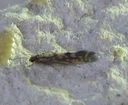Microcaddisflies
Hydroptilidae
Classification
- Phylum: Arthropoda
- Subphylum: Hexapoda
- Class: Insecta
- Order: Trichoptera
- Suborder: Integripalpia
- Superfamily: Hydroptiloidea
- Family: Hydroptilidae
Pronunciation
How to pronounce Hydroptilidae: /haɪdroʊˈptɪlɪdiː/
These audio files are automatically generated. While they are not always 100% accurate, they are a good starting point.
Images






Summary
Hydroptilidae, commonly known as microcaddisflies, are a diverse family of small caddisflies that are notable for their unique purse-shaped larval cases. With a worldwide presence and significant biodiversity, they play essential roles in freshwater ecosystems.
Physical Characteristics
Hydroptilidae are small caddisflies, rarely exceeding 5 mm (0.20 in) in length. Their larvae develop a purse-shaped case in the final instar.
Identification Tips
To identify Hydroptilidae, look for their small size and the presence of a purse-case, which can be portable or attached to the substrate during the larval stage.
Habitat
Commonly found in freshwater environments, including rivers and streams.
Distribution
Globally distributed, with around 270 species in 14 genera in specific areas and more than 2000 species in 75 genera worldwide.
Diet
Hydroptilidae larvae are herbivorous, feeding on algae and plant material.
Life Cycle
The life cycle includes an aquatic larval stage followed by pupation in a constructed case, leading to the adult stage.
Reproduction
Details about reproductive habits are not specified, however, like many insects, they are expected to reproduce sexually with external egg laying.
Predators
Natural predators include various aquatic insectivores and fish that feed on larvae and adults.
Ecosystem Role
As aquatic herbivores and prey for other animals, Hydroptilidae play a role in freshwater ecosystems.
Collecting Methods
- Light trapping
- Hand netting
- Sweeping vegetation near water bodies
Preservation Methods
- Ethanol storage
- Slide preparation for microscopy
- Drying specimens
Evolution
The family Hydroptilidae is placed in the Trichoptera order and may be closely related to Glossosomatoidea, although their phylogenetic placement is still debated.
Similar Taxa
Misconceptions
The family name 'microcaddisflies' implies an extensive grouping, but they are specifically a subgroup within the larger caddisfly classification without medical or harmful implications.
Tags
- Caddisflies
- Hydroptilidae
- Microcaddisflies
- Trichoptera
- Insects